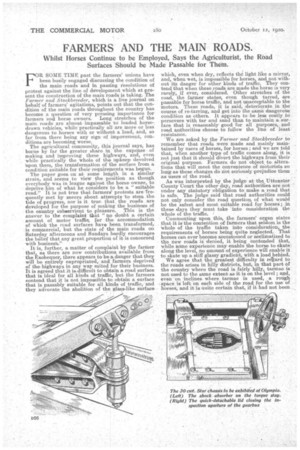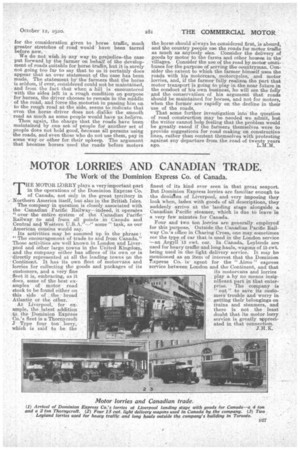FARMERS AND THE MAIN ROADS.
Page 38

Page 39

If you've noticed an error in this article please click here to report it so we can fix it.
Whilst Horses Continue to be Employed, Says the Agriculturist, the Road Surfaces Should be Made Passable for Them.
OR SOME TIME past the farmers' unions have been busily engaged discussing the condition of
the main roads and in passing fesolutions of protest against the line of development which at present the construction of the main roads is taking. The Farmer and Stockbreeder, which is a live journal on behalf of farmers' agitations, points out that the condition of the main roads throughout the country has become a question of very pressing importance for farmers and horse owners. Long stretches of the main roads are almost impassable to loaded horsedrawn vehicles, while practically all are more or less dangerous to horses with or without a load, and, so far from there being any sign of impovement, conditions are becoming worse.
The agricultural community, this journal says, has borne by far the greater share in the expense of making and improving these highways, and, even while practically the whole of the upkeep devolved upon them, the transformation of the surface from a condition suitable for their requirements was begun. .
The paper goes. on at some length in a similar strain, and ,seems to view the position as though everybody was in league against the home, owner, to deprive him of what he considers to be a "suitable road?' It is not true that farmers' protests are frequently\ met by sneers about attempts to stem the tide of progress, nor is it true that. the roads are developed for the purpose of making the business of the country subservient to pleasure. This is the answer to the complaint that "no doubt a certain amount of motor traffic, for the accommodation of Which the road surfaces have been transformed, is commercial, but the state of the main roads on Saturday afternoons and Sundays hardly encourages the belief that any great proportion of it is concerned with busbies's."
It is, further, a matter of complaint by the farther that, as there are now contributions available from Exchequer, xchequer, there appears to be a danger that they will be entirely expropriated,. and farmers deprived of the highways in any way suited for their business. It is agreed that it is-difficult to obtain a road surface that is ideal for all kinds of traffic but the farmers contend that it is not impossible to : obtain a surface that is passably suitable for all kinds of traffic,' and they advocate the abolition of the glass-like surface which, even when dry, reflects the light like a mirror, and, when wet, is impossible for horses, and notwith out its danger for other kinds, of traffic. They con tend that when these roads are made the horse is very rarely, if ever, considered. Other stretches of the road, the farmer states, even though tarred, are passable for horse traffic, and not unacceptable to the motors. These roads, it is said, deteriorate in the course of re-tarring, and get into the same dangerous condition as others. It appears to be less costly to persevere with tar and sand than to maintain a sur face that is reasonably good for all purposes, and road authorities choose to fallow the line of least resistance.
We are asked by the Farmer and Stockbreeder to remember that roads were made and mainly maintained by users of horses, for horses; and we are told that when another type of traffic comes along, it is,
not just that it should divert the highways from their original purpose. Farmers do not object to altera tions that will meet the convenience of motorists so long as these changes do not seriously prejudice them as users of the road.
As was interpreted by the judge at the Uttoxeter County Court the other day, road authorities are not under any statutory obligation to make a road that is safe. The judge said that road authorities could not only consider the road question, of what would be the safest and most suitable road for horses; in these days they must take into consideration the whole of the traffic. Commenting upon this the farmers' organ states that it is the contention of farmers that seldom is the Whale of the traffic taken into consideration, the requirements of horses being quite neglected. That homes can ever become accustomed or acclimatized to the new roads is denied, it being contended that, while same experience may enable the horse to skate along the level, no amount of experience will enable it to skate up a stiff glassy gradient, with a load behind.
We agree that the greatest difficulty in rebrd to the roads arises in hilly districts, but, in that part of the country where the road is fairly hilly, tarmac, is not used to the same extent as it is on the level ; and, even on inclines where tarmac is used, a rough space is left on each Bide of the road for the use of horses, and it is ouite certain that, if it had not been
for the consideration given to horse traffic, much greater stretches of road would have been tarred before now.
We do not wish in any way to prejudice-the case put forward by the farmer on behalf of the development of roads suitable for horse traffic; but it is surely not going too far to say that to us it certainly does appear that an over statement of the case has been made. The statement by the farmers that the horse is seldom, if ever, considered could not be maintained, and from the fact that when a hill is encountered with the sides left in a rough condition on purpose for horses, the driver chooses to remain in the middle of the road, and force the motorist in passing him on to the rough road at the side, seems to indicate that even the horse driver does not dislike the smooth road as much as some people would have us believe.
Then again, the charge that the roads have lieen maintained by one set of people for another set of people dots not hold good, because all persons using the roads, and even those who do not use them, pay in some way or other for their upkeep. The argument that because horses used the roads before motors
the horse should always be considered first, is absurd; and the country people use the roads for motor traffic as much as anybody &se. Consider the delivery of goods by motor to the farms and other houses in the villages. Consider the use of the road by motor omnibuses for the purpose of serving the countryman. Con , sider the extent to which the farmer himself uses the roads with his motorcars, motorcycles, and motor lorries' and, if the farmer fully realizeis the Part that motor transport is going to play in the near future in the conduct of his own business, he will see the folly and the conservatism of his argument that roads should be maintained for horses, and not for motors, when the former are rapidly on the decline in their use of the roads.
That some further investigation into the question of road construction may be needed we admit, but the writer cannot help feeling that the problem would be greatly eased if the farmers themselves were to provide suggestions for road making on constructive lines, rather than content themselves with protesting against any departure from the road-of twenty years ago. L. M. M.




























































